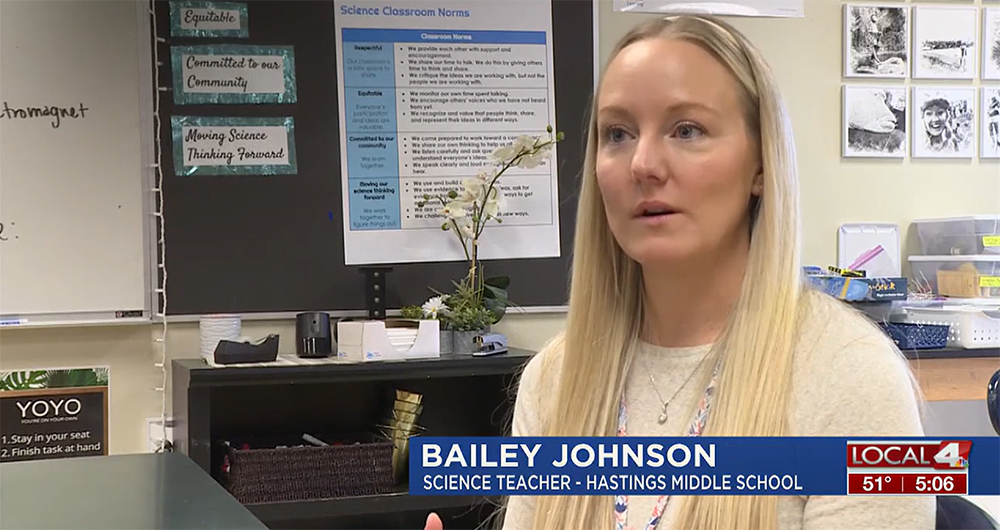
by Leroy Triggs, KSNB Local4, Hastings
HASTINGS, Neb. (KSNB) - Hastings Middle School eighth-grade science teacher Bailey Johnson earned a chance to speak at the NSTA Conference in Kansas City recently about her teaching approach, authentic learning.
Watch video: https://www.ksnblocal4.com/2023/11/29/hastings-science-teacher-introduces-new-style-teaching/?outputType=amp
Johnson, who is in her 13th year at HMS, is in the second cohort of the National Science Foundation Robert Noyce Master Teacher Fellowship Program. Authentic learning helps make the subject relevant to students by incorporating the real world, Johnson said.
As part of the MTF program, Johnson researched what authentic learning is, what it looks like in a science classroom and how it will benefit the students. Johnson wrote a research paper on the topic and read any book she could find about authentic learning. Johnson said authentic learning and Nebraska’s education standards align.
“The standards have come out with teaching kids to be more 'scientists' than anything else, and the authentic learning puts them in a position of being a scientist or acting like a scientist, or doing the things that a scientist would do,” Johnson said.
The Next Generation Science Standards encourage students to ask questions and conduct and plan investigations. That leads to students buying into the lesson plan, and just like for scientists, authentic learning starts with gathering information.
“In my classroom I’ll always try to illicit prior knowledge,” Johnson said. “See what they’re bringing in. What do they know? Like today I asked them, ‘what do you know about magnets?’ They’re bringing in a little bit of information, so that’s our starting point. I access where they’re at, and then from there I also have them come up with related phenomena, where have they seen this before.”
Johnson said students are excited to share where they have noticed science played a factor. She said bringing prior experiences into the fold is a huge part of authentic learning, because it connects what’s in textbooks to what they see. When that connection is made, students understand the subject better, which usually leads to increased test scores. Johnson feels this method of teaching resonates the most with students.
“If you teach authentically and provide enough authentic science learning opportunities kids will buy in because they will feel like it matters to them and it’s relevant and they’re like ‘Oh I can relate this to to this experience I had in my life.’”
Johnson said when that happens it lights a fire in them and unlocks their creativity. They start to ask ‘What if’, which Johnson describes as “the most beautiful reaction a kid can come up with.” She said the Robert Noyce Master Teacher Fellowship Program has helped her become a better teacher.
“In this program we also are taught about leadership styles and inclusion in the classroom,” Johnson said. “Honestly that is one of the biggest changes I’ve made is to become a little bit more culturally competent as a teacher in my approach by asking students about their experiences."